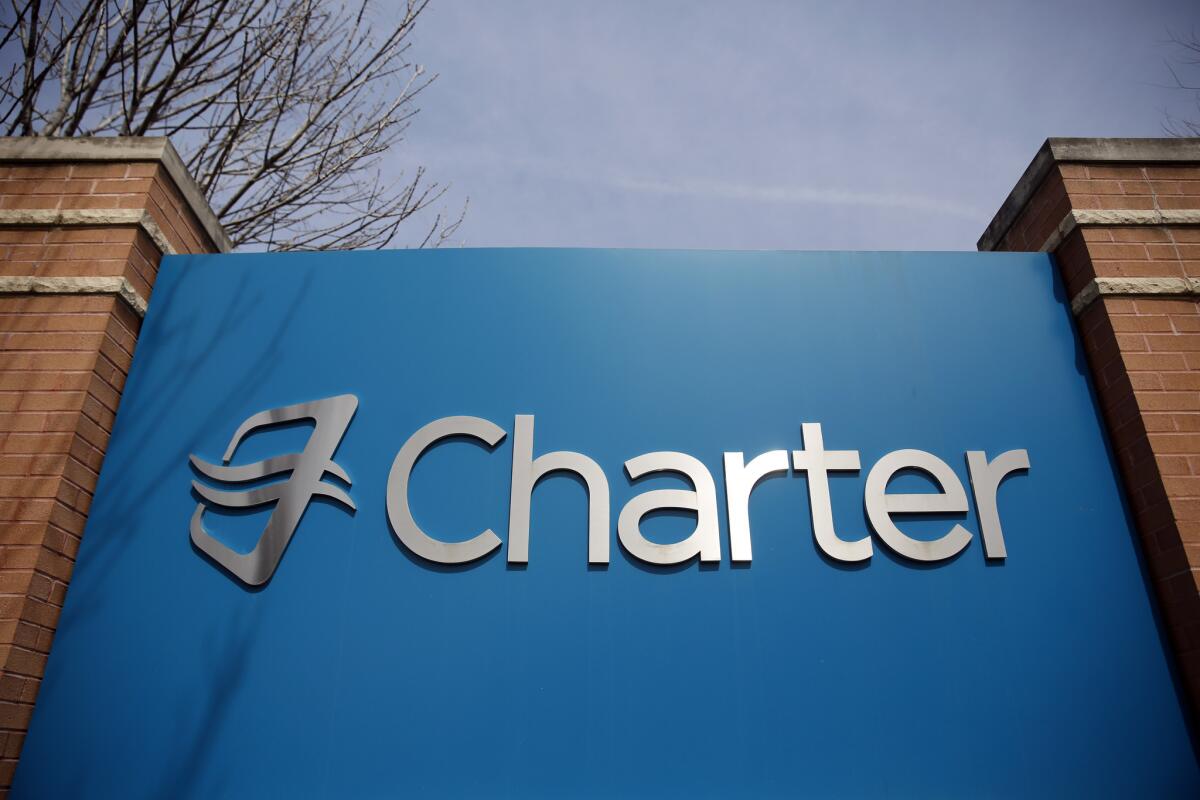FCC chairman, Justice Department sign off on Charter’s takeover of Time Warner Cable

- Share via
Key federal regulators have signaled support for Charter Communications’ $71-billion-plus acquisition of Time Warner Cable and Bright House Networks, subject to several conditions aimed at spurring competition among Internet service providers and increasing the number of homes with broadband Internet connections.
Federal Communications Commission Chairman Tom Wheeler said Monday that he would vote in favor of the deal, which is expected to dramatically reshape the pay-TV and Internet-service market in the U.S. In addition, Charter would become the largest Internet and cable TV provider in Southern California, with more than 2 million customer homes.
The U.S. Justice Department, which separately reviewed the transaction to make sure that it did not violate antitrust laws, also said it would allow the deal to move forward. Justice Department officials proposed a settlement with Charter that would restrict the Stamford, Conn., cable company from trying to thwart the ability of online video distributors, such as Hulu or Netflix, to obtain video content from TV programmers.
Historically, Charter’s core business has been providing bundles of TV channels. That model faces pressure from online streaming services that are attracting millions of customers with their low-cost subscriptions. But providing Internet service has increasingly become a more lucrative line for Charter and other cable companies.
Federal regulators tailored several of the conditions to address Charter’s rising Internet clout — requiring Charter to expand broadband service in areas with spotty service, for instance, and to sign up poor families who cannot afford Internet service. Charter would be required to provide low-cost Internet service to at least 525,000 low-income homes.
Charter also would have to provide 1 million new Internet connections in areas where other high-speed operators deliver service in an effort to encourage more competition.
Some critics said the deal, which accelerates the consolidation of media, still has problems.
“There’s nothing about this massive merger that serves the public interest,” Craig Aaron, president of the nonprofit group Free Press, said in a statement. “There’s nothing about it that helps make the market for cable-TV and Internet services more affordable and competitive for Americans.”
Four other FCC commissioners now must sign off. Their approval could come as early as this week.
The FCC, in conjunction with the Justice Department, tailored several conditions to focus on eliminating barriers to video streaming. For example, Charter would not be permitted to charge usage-based prices or impose data caps on its customers.
The FCC also would prohibit Charter from charging interconnection fees, including to online video providers such as Netflix, which deliver large volumes of Internet traffic to broadband customers.
Wheeler said the conditions would last seven years, although Charter could apply to have them relaxed after five years.
The Justice Department’s proposed settlement did not address the lack of distribution for the Los Angeles Dodgers’ channel, SportsNet LA, or whether the government would require Charter to increase the availability of the channel in Southern California.
The union of Charter, Time Warner Cable and Bright House Networks would create the second-largest cable TV company and Internet service provider, and the third-largest pay TV provider, in the nation, with more than 23 million customers in 41 states. Only Comcast Corp. will have more cable customers.
“The conditions that will be imposed ensure Charter’s current consumer-friendly and pro-broadband businesses practices will be maintained by new Charter,” Charter said in a statement.
Charter has structured a cash-and-stock deal, currently valued at about $60 billion, to buy Time Warner Cable. Acquiring the privately held Bright House will cost an additional $11 billion.
When the deal is completed, Charter will have roughly $60 billion in debt on its books, including about $21 billion in existing Time Warner Cable debt.
In addition to Los Angeles and San Diego, the company will become the leading cable provider in New York; Dallas; Tampa, Fla.; Indianapolis; Detroit; and Bakersfield.
George Slover, senior policy counsel for the nonprofit Consumers Union, which publishes Consumer Reports magazine, said that while the proposed conditions were promising, he still worries about how Charter will use its clout.
“Since Day One, we’ve been very skeptical of this deal and the power it could give one company to become a cable and broadband giant,” Slover said. “History has shown us how powerful companies look for every angle to avoid or weaken the conditions imposed on their mergers, so the government is going to have to back up these tough conditions with tough enforcement.”
Aaron, of Free Press, noted that Time Warner Cable Chief Executive Rob Marcus, who has been in the job a little more than two years, “will walk away with a $100-million golden parachute” according to Securities and Exchange Commission filings.
Charter still must secure the approval of the California Public Utilities Commission. That vote — scheduled for May 12 — will mark the final stop in Charter’s long journey to secure approvals from various state regulators for the merger that it unveiled 11 months ago.
This month, a judge in San Francisco reviewing the matter for the PUC recommended approval of the deal. However, he attached several conditions designed to expand the number of families who receive high-speed Internet service in their homes.
Pay-TV operators are bulking up to better withstand shifting consumer behavior.
Last summer, AT&T acquired DirecTV, based in El Segundo, in a $49-billion merger that catapulted the phone giant into becoming the nation’s largest pay-TV provider, with 26 million customers.
Frontier Communications completed its $10.5-billion purchase of Verizon’s wire line, broadband Internet and FiOS TV businesses in California, Texas and Florida and took over Verizon’s operations on April 1. That has led to many consumer complaints about dropped service and other problems.
The Charter-Time Warner Cable-Bright House deal was announced about four weeks after Comcast Corp.’s ambitious bid for Time Warner Cable collapsed under government scrutiny. Federal regulators signaled that they would block the Comcast-Time Warner Cable combination because they did not want one company to control so many broadband Internet connections.
Charter will dramatically expand its geographic service area and has said it will achieve $800 million in synergies annually from the deal. Los Angeles is viewed as an important market, which Charter will look to dominate by consolidating its operations with the much larger Time Warner Cable.
Twitter: @MegJamesLAT
More to Read
From the Oscars to the Emmys.
Get the Envelope newsletter for exclusive awards season coverage, behind-the-scenes stories from the Envelope podcast and columnist Glenn Whipp’s must-read analysis.
You may occasionally receive promotional content from the Los Angeles Times.











